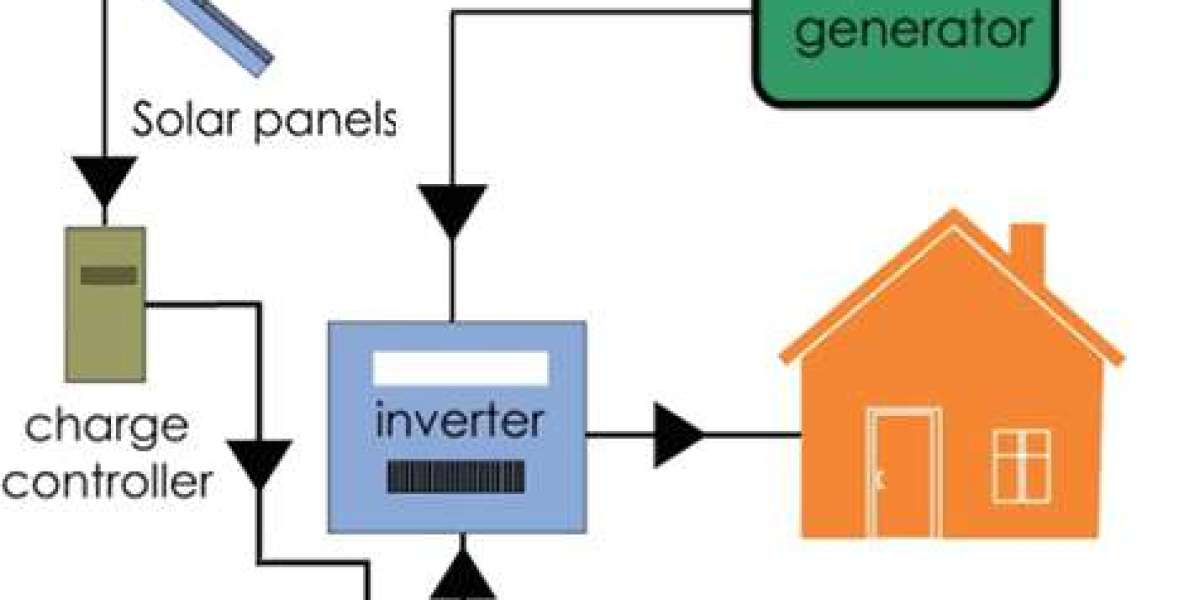An off-grid solar system is a standalone power generation system that operates independently of the traditional electricity grid. It typically consists of solar panels, a charge controller, batteries for energy storage, and an inverter.
What is an off-grid solar panel system?
An off-grid solar panel system is a self-sustaining energy solution that operates independently of the traditional power grid. Comprised of solar panels, a charge controller, batteries, and an inverter, this system harnesses sunlight to generate electricity. Solar panels for homes in India capture sunlight and convert it into electrical energy through photovoltaic cells. The charge controller regulates the flow of electricity from the solar panels to the batteries, ensuring they are charged efficiently without overloading. Batteries store the excess energy produced during sunny periods for use during times of low sunlight or at night when solar panels for homes in India output is minimal. The inverter then converts the stored direct current (DC) electricity into alternating current (AC), suitable for powering household appliances and devices. Off-grid solar panel systems are particularly valuable in remote locations where access to the grid is limited or impractical, providing a reliable and sustainable source of electricity for homes, businesses, and communities.
How do off-grid solar panel systems work?
Off-grid solar panel systems work by harnessing sunlight to generate electricity independently of the traditional power grid. Here's how they operate:
- Solar panels: Photovoltaic (PV) solar panels capture sunlight and convert it into direct current (DC) electricity through the photovoltaic effect. These panels are typically installed on rooftops or in areas with ample sunlight exposure.
- Charge controller: The charge controller is a crucial component that regulates the flow of electricity from the solar panels to the batteries. It prevents overcharging of the batteries, which can damage them and reduce their lifespan. Additionally, the charge controller may optimize the charging process to ensure maximum efficiency.
- Batteries: Energy generated by the solar panels is stored in batteries for later use. This allows the system to provide electricity during periods of low sunlight or at night when the solar panels are not producing electricity. Batteries used in off-grid solar systems are usually deep-cycle batteries designed to withstand frequent charging and discharging cycles.
- Inverter: The inverter is responsible for converting the stored DC electricity from the batteries into alternating current (AC) electricity, which is used to power household appliances and devices. Most appliances and electronics in homes are designed to operate on AC power, so the inverter plays a crucial role in making the electricity usable.
- Load management: Off-grid solar systems often incorporate load management strategies to optimize energy usage and ensure that electricity demand does not exceed the system's capacity. This may involve prioritizing essential loads, such as lighting and refrigeration, and using energy-efficient appliances to minimize power consumption.
What are the benefits of an off-grid solar panel system?
Off-grid solar panel systems offer for home several benefits, making them an attractive option for many individuals and communities:
- Energy Independence: Off-grid solar systems allow users to generate their electricity, reducing reliance on centralized power grids and utility companies. This independence provides greater control over energy production and consumption.
- Remote Access: Off-grid solar systems can be deployed in remote or off-grid locations where access to traditional power infrastructure is limited or non-existent. This enables energy access in rural areas, off-grid cabins, and remote communities.
- Environmental Sustainability: Solar energy is a clean and renewable energy source, producing electricity without emitting greenhouse gases or pollutants. Off-grid solar systems contribute to reducing carbon footprint and mitigating climate change.
- Cost Savings: While the initial investment for off-grid solar systems can be significant, they offer long-term cost savings by eliminating monthly utility bills. With proper maintenance, solar panels can have a lifespan of 25 years or more, providing reliable electricity at no additional cost after the initial investment.
- Reliability: Off-grid solar panel systems for homes typically include battery storage, allowing users to store excess energy generated during the day for use at night or during periods of low sunlight. This provides a reliable source of electricity even when sunlight is unavailable.
- Energy Security: Off-grid solar systems offer energy security by providing a decentralized energy source. In the event of power outages or disruptions to the grid, off-grid solar users can continue to access electricity independently.
- Scalability: Off-grid solar systems can be easily scaled up or expanded by adding additional solar panels, batteries, or inverters to meet changing energy needs. This scalability makes off-grid solar systems adaptable to a variety of applications, from small off-grid homes to larger commercial installations.
What is the price of an off-grid solar panel system?
India is a developing nation that has seen rapid growth in the number of households shifting to off–grid solar systems. This is mainly due to the high cost of grid electricity and the availability of cost–effective off–grid solar systems. Off-grid solar systems Prices in India are available in a wide range depending on the size of the system and the quality of the components. Generally, a 1 kW off-grid solar system in India costs around Rs. 45,000 – Rs. 70,000 ($600 – $900). Larger systems with higher capacity can cost up to Rs. 1.5 lakhs ($2,000). However, this cost can be reduced significantly if the system is installed under government subsidy schemes. Thus, off–grid solar systems are becoming increasingly accessible to the Indian population as the prices become more affordable.
Conclusion — off-grid solar panel systems offer a sustainable, reliable, and cost-effective solution for meeting energy needs independently of the traditional power grid. By harnessing sunlight to generate electricity, these systems provide energy independence, particularly in remote areas where access to the grid is limited or unavailable. Off-grid solar systems contribute to environmental sustainability by reducing reliance on fossil fuels and mitigating greenhouse gas emissions. They offer benefits such as energy security, scalability, and long-term cost savings, making them an attractive option for individuals, businesses, and communities seeking to reduce their carbon footprint and increase energy independence. While upfront costs may vary depending on system size and components, off-grid solar panel systems offer a promising pathway toward a cleaner, more sustainable energy future.









